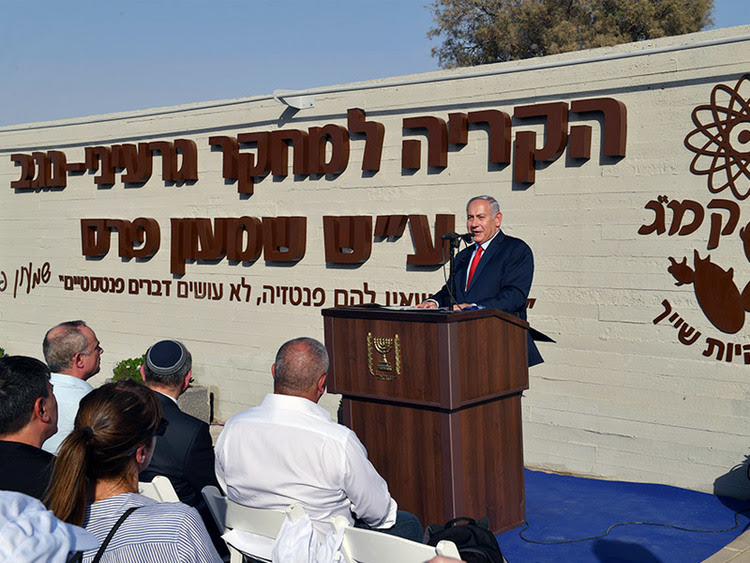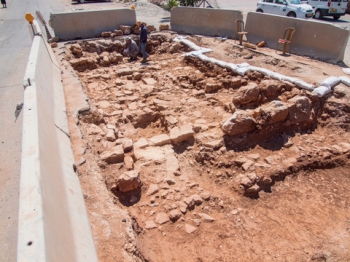Science & Technology
- Details
- Written by Prime Minister's Media Adviser

We will continue to take strong and determined action against Iran's attempts to station forces and advanced weapons systems in Syria. Whoever threatens us with destruction puts himself in similar danger, and in any case will not achieve his goal.
PM Netanyahu at the renaming ceremony for the Shimon Peres Negev Nuclear Research Center .
Photo: GPO/Kobi Gideon
- Details
- Written by Israel Innovation Authority

Six winning Israeli startups will take part in the “Israel-India Bridge to Innovation” program and will soon launch pilot programs in India. The program was initiated in meetings between the prime ministers of India and Israel.
Six Israeli startups with innovative technologies in the fields of healthcare, agriculture, and water management have made it to the final stage of the Israel Innovation Authority’s “Israel-India Bridge to Innovation” program, launched over the past year during bilateral meetings between the prime ministers of both countries. The 18 companies that were initially selected to participate in this program presented their technologies to CEOs and investors from Israel and India in a Demo Day held last week at the Urban Place complex in Tel Aviv. Six companies were chosen to continue to the final stage where they will pilot their solutions in India.
Among the notable participants taking part in the Demo Day were representatives of India’s Invest India agency. The keynote speaker was Rohtash Mal, Chairman of EM3 Agriservices, renowned in India as the “Uber of farmers.” The company rents out equipment to farmers based on time or acres farmed, doing away with the need for farmers to purchase expensive equipment and giving them access to advanced technology at low costs.
The six winning companies selected to continue to the pilot stage of the program are:
In Agriculture:
Amaizz, a company that has developed a portable drying device enabling dry storage of agricultural produce – of immense significance in the Indian market, where it is difficult to ship fresh produce.
Biofeed, a company that has developed a device to combat fruit flies, a pest destructive to India’s yield of mango and other fruit. India is one of the world’s key mango exporters.
In Healthcare:
Zebra Medical, a company developing medical imaging technologies.
MobileODT, a company that has developed devices to diagnose cervical cancer.
In Water Management:
Aquallence, a company that has developed a device to treat water with Ozone.
AMS Technologies, a company that has developed a system to filter industrial water.
The 18 companies initially selected were reviewed by a panel of judges from Israel and India who looked at over 150 applications. The companies took part in a six-month process that included training and workshops, including information regarding Indian markets, together with professional visits, networking events, mentoring and meetings with senior executives and officials, including investors, senior management and experts and entrepreneurs in the fields of water management, agriculture and healthcare.
The Demo Day judges included members of Indian and Israeli companies, including entrepreneur Ofir Shalvi; Adi Vagman, Managing Partner of the AgriNation venture capital fund; Sigalit Berenson, Sales and Service Manager of the Indian-owned Decco SafePack company; Deeksha Vats, Joint President of Sustainability at the Indian corporation, Aditya Birla Group; Rajit Mehta, CEO of the Max Healthcare Institute; and Avi Luvton, Executive Director of the Asia Pacific and Latin America desk at the Israel Innovation Authority.
Eli Cohen, Israeli Minister of Economy and Industry, said: “Following the government decision a year ago to invest 240 million shekels by the year 2020 to promote relations with India in the fields of innovation and technology, the “Israel-India Bridge to Innovation” program is a golden opportunity for Israeli companies in the fields of healthcare, water management and agritech to achieve prominence and to enter such a significant and developing global market – India.”
Dr. Ami Appelbaum, Chief Scientist at the Israeli Ministry of Economy and Industry and Chairman of the Israel Innovation Authority, said: “The Israel-India Bridge to Innovation is a springboard for cooperation between Israeli innovators and Indian corporations. The collaboration between India, a massive economy with the largest growth rate in the world, and Israel, the “Startup Nation,” to develop technological solutions to various challenges, is synergistic and unique. There is a real mutual desire, backed by substantial investment, to pilot these cooperative ventures in India in order to solve pressing global challenges specifically in India but all over the world as well.”
Avi Luvton, Executive Director of the Asia Pacific Desk at the Israel Innovation Authority, emphasized that the “Bridge to Innovation” program comes at a peak in Israeli-Indian relations that began more than a year ago and which has been strengthened by bilateral visits by both prime ministers, reflecting an era in which many new opportunities are opening up within the Indian economy.
- Details
- Written by Israel Antiquities Authority

Greetings from the Roman Empire! A Section of an 1,800 Year Old Road was Exposed in Jerusalem
According to the excavation director on behalf of the Israel Antiquities Authority, “This is the first time we have encountered such a finely preserved section of the road in Jerusalem”. The road was exposed within the framework of an IAA archaeological excavation prior to the installation of a drainage pipe by the Moriah Company.
- Details
- Written by Silvia Golan

MAD: Marketing, Advertising, Digital and Communications July 17th, 2012 | Wednesday At David InterContinental Hotel , Tel Aviv
- Details
- Written by Israeli Presidential Conference
In what has become an annual tradition at the Israeli Presidential Conference, Dr. Yossi Vardi, noted high-tech investor, led a lively panel discussion on the new media developments of tomorrow.
Participants in the panel – entitled “New Media – Is It Still Renewing?” – included AOL Chairman and CEO Tim Armstrong, Marc Benioff, Founder, Chairman and CEO of Salesforce.com, Marvell Co-Founder Weili Dai, IMAX CEO Richard Gelfond, Maurice Lévy, CEO of Publicis Groupe, Robert P. LoCascio, CEO of LivePerson, and Deutsche Telekom CEO Rene Obermann.
Art & Culture
 .Tel Aviv University Launches International MA in Jewish Studies
.Tel Aviv University Launches International MA in Jewish Studies Tel Aviv University Launches International MA in Jewish Studies A Global, Immersive Academic Experience Tel Aviv, Israel —...
Read More...
 .Israel Canada Fashion Week Tel Aviv 2025, Opens in a new space at the Kreminizki Complex.
.Israel Canada Fashion Week Tel Aviv 2025, Opens in a new space at the Kreminizki Complex. Israel Canada Fashion Week Tel Aviv 2025, Opens in a new space at the Kreminizki Complex.TLV Israel | October 26-30, 2025. This year is the...
Read More...
 .The 40th season of the Israel Opera with many exciting new features
.The 40th season of the Israel Opera with many exciting new features The Israeli Opera celebrates 40 years of creation with a rich and diverse season centered on seven operatic productions that unite...
Read More...
 A diplomatic cocktail and art exhibition jointly organized by the Diplomatic Institute and Afik & Co. Law
A diplomatic cocktail and art exhibition jointly organized by the Diplomatic Institute and Afik & Co. Law A diplomatic cocktail and art exhibition jointly organized by the Diplomatic Institute and Afik & Co., held on September 8, 2025 at...
Read More...
Products & Services
 . Zhuhai Pilot Technology Subsidiary Sino EV Energy Presents Advanced EV Infrastructure Solutions at RAX Expo in Tel Aviv
. Zhuhai Pilot Technology Subsidiary Sino EV Energy Presents Advanced EV Infrastructure Solutions at RAX Expo in Tel Aviv The Chinese energy group, a global leader in smart charging technologies, will showcase its advanced solutions for...
Read More...
 . Biotech Clinic» Herzliya Pituach leading clinic in Israel with the most advanced technologies in the world in aesthetic & Dental medicine
. Biotech Clinic» Herzliya Pituach leading clinic in Israel with the most advanced technologies in the world in aesthetic & Dental medicine Spring is here, and it makes us want to renew ourselves. Today I am going to tell you about «Biotech Clinic» the leading clinic in...
Read More...
 . Waldorf Astoria Jerusalem was Voted as One of The Five Best City Hotels In The Middle East Of 2023 by The Esteemed Travel + Leisure Magazine
. Waldorf Astoria Jerusalem was Voted as One of The Five Best City Hotels In The Middle East Of 2023 by The Esteemed Travel + Leisure Magazine Waldorf Astoria Jerusalem was Voted as One of The Five Best City Hotels In North Africa And The Middle East Of 2023 By The...
Read More...

